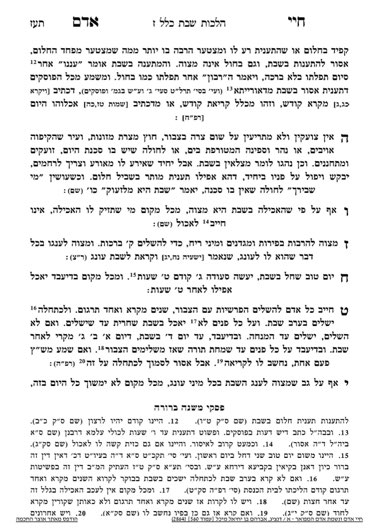The current series, which will cover seudos Shabbos and fasting on Shabbos, is available for sponsorship. Please contact Rabbi Reingold for more information.
We are beginning siman 5, where the Chayei Adam discusses types of requests a person is allowed to request on Shabbos. As an introduction, we know that Chazal limited the requests a person can make on Shabbos, as we see by Chazal replacing the weekday shemoneh esrei with unique shemoneh esrei’s for Shabbos. The Bavli says that Chazal shortened the shomeh esrei so people would have more time to enjoy oneg Shabbos. The Yerushalmi says that Chazal shortened the davening so that a person does not become pained by the things he needs, which would cause sadness and detract from oneg Shabbos.
The sefer Abudraham, written by Rav Dovid Abudraham, one of the gedolei Sepharad, writes about a person who accidentally davens the weekday shemoneh esrei on Shabbos. The halacha is that a person should finish off that bracha and then switch to the Shabbos shemoneh esrei. Apparently, the weekday shemoneh esrei is applicable to shabbos. So don’t we say it?
He explains that, in general, we know if a person has a personal request to make as it relates to one of the brachos of shemoneh esrei (such as a choleh at home), they add it to the specific bracha of shemoneh esrei. Since one is allowed to add personal requests during the week, we are concerned that if we were to recite the regular shemoneh esrei on Shabbos, a person would add their personal bakashos and get carried away with the sadness, extend their tefillah, and then detract from their oneg Shabbos. Thus, according to the Abudraham, the issue is not the weekday shemoneh esrei in itself, but the personal bakashos which would be recited in conjunction with the weekday shemoneh esrei. Therefore, Chazal instituted not to recite personal bakashos on Shabbos, due to the emotional pain which will come with it. The Abudraham understands that the issue is a combination of the reasons of the Bavli and Yerushalmi, namely, Chazal did not want a person to be pained by the things they need which would cause them to daven for longer and detract from their oneg Shabbos.
On the other hand, if a person has an immediate need, the opposite is true. The act of tefillah will help relieve a person of their sadness, similar to the concept of fasting on Shabbos. Therefore, if a person has an immediate need, a person could and should make those bakashos, and if it is not immediate, we ask a person to put their personal needs aside and focus on oneg Shabbos.
Summary
- Chazal limited personal bakashos on Shabbos, so that one does not get carried away with their sadness and detract from oneg Shabbos. On the other hand, if there is an immediate need, one should daven, as davening will help relieve the person of their sadness.



